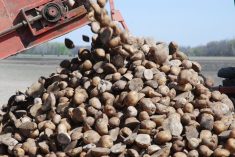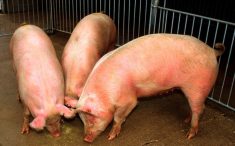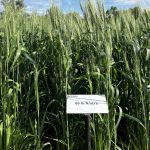Potato wart’s appearance in another Prince Edward Island potato field in August has led to a new round of rules for the province’s potato exports to the U.S.
The Canadian Food Inspection Agency (CFIA) on Monday announced new requirements effective “immediately” for such exports, citing the detection of potato wart in 23 fields in the province since it was first detected there in 2000.
If they’re to be exported to the U.S. from P.E.I., packaged table stock potatoes and bulk, washed potatoes for processing and repackaging now must have a CFIA phytosanitary inspection; a phytosanitary certificate or certificate of origin stating they were grown in a field where potato wart’s not known to occur; and treatment with a registered sprout inhibitor if they were harvested more than 30 days prior to shipment.
Read Also

U.S. grains: CBOT soybeans, corn, wheat fall in USDA data aftermath
Chicago grains took a dive on Friday, following a closely watched U.S. government crop report and the release of export data that could provide clues into Chinese buying.
Packaged table stock potatoes from P.E.I. now must also be washed or dry-brushed, meet a Canada or U.S. No. 2 grade standard or higher, and be packaged in containers of 22.72 kg (50 pounds) or less.
Bulk, unwashed table stock potatoes coming from P.E.I. for processing or repacking will now need a U.S. import permit; acceptable documentation that they were grown in a field where potato wart’s not known to occur; and treatment with a registered sprout inhibitor if they were harvested more than 30 days prior to shipment. They also can now only be shipped to a facility with a compliance agreement administered by the U.S. Department of Agriculture’s Animal and Plant Health Inspection Service (APHIS).
Seed potatoes bound for the U.S. from P.E.I. must now have a phytosanitary certificate and must come from a field that’s been soil-sampled, tested for and found free of potato wart within a year of harvest. The seed potatoes must also be visually inspected during harvest or within 10 days of harvest.
P.E.I. seed potatoes harvested before the publication of the U.S. federal order on Monday will now also need a visual inspection by CFIA instead of the harvest inspection, the agency said.
CFIA said Monday it negotiated these terms with APHIS “to prevent the spread of potato wart and maintain market access for Canadian potato growers.”
The findings of potato wart in P.E.I. are “expected,” CFIA said, and have been “a result of ongoing CFIA survey activities and industry vigilance.”
The agency said it will seek “full collaboration” of stakeholders in the potato industry “to continue traceability activities and to verify that all applicable treatments have been applied.”
In Canada, the fungus causing potato wart is only known to have appeared in P.E.I. and Newfoundland. In the U.S., it’s been confirmed in West Virginia, Maryland and Pennsylvania but has since been declared “eradicated” in all three states.
The disease is no risk to human health or food safety but can reduce potato yield and make potatoes unmarketable.
The soil-borne fungus attacks growing points on a potato plant, such as eyes, buds and stolon tips. The fungus can remain dormant in the soil for several years or more as resting spores.
Potato wart can appear on all underground parts of the plant except its roots. Above-ground symptoms aren’t usually apparent, except maybe reduced plant vigour. — AGCanada.com Network













